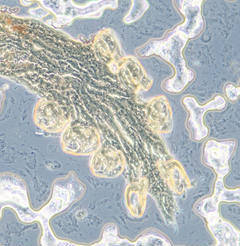
The human body is its own ecosystem; millions of bacteria and organisms call it home. Usually the body exists in symbiosis with these organisms, some of them provide benefit. Other organisms, parasites, provide no benefit and are usually harmful. Parasites are similar to fleas or ticks on a dog, but inside your body. They live in and attach to our intestines; they absorb nutrients, lay eggs, and excrete toxic waste (formalin, isopropyl alcohol and formaldehyde) inside us.
The risk of infection is widespread. It is estimated that more than 90% of all Americans are infected with some type of harmful organism. Infection can come from “benign” activities like eating at a restaurant, owning a pet, or having a child in school or daycare. Food handlers can spread parasites through unsafe or unclean practices. Pets can pick up parasites from insect bites and introduce them into the home. The undeveloped hand washing skills and curiosity of children usually leads to lots of indirect contact with every type of infectious agent. Soldiers, travelers and workers returning from overseas often bring internal parasites with them as a result of eating or drinking contaminated food in other countries. Plumbers, sanitation engineers, and outdoor workers are also more likely to come into contact with harmful organisms.

Intestinal Parasites
Length: 3 minutes
Common Harmful Organisms:
Pinworms
Pinworms are very common in the United States. Adult pinworms live in the colon and can remain there for months. Female pinworms leave the host through the anus and lay eggs on the skin. Pinworms cause itchiness and irritation around the anal area, and they are often spread because the infected person (usually children) scratches the area and touches another surface. Eggs left on clothing or bedding can be ingested through direct contact with the mouth or while breathing. Eggs can survive up to three weeks outside the human body.
Hookworms
Hookworms occur in soil or water and can be ingested by eating unwashed produce or drinking contaminated water. Infection may also happen through open wounds, especially in areas where there is animal feces. Hookworms use their teeth to attach themselves to the intestinal wall and siphon blood. They can cause anemia, weight loss, and malnutrition.
Roundworms
Roundworms are the most common harmful organism in the world. Female roundworms enter the small intestine as larvae and can grow to over a foot long. Infection is spread through ingestion of fecal matter, not person-to person contact. Infection may be asymptomatic, although heavy infestations could cause intestinal blockage.
Tapeworm
Tapeworm infection happens by swallowing an infected flea and, though rare in humans, can be serious. Symptoms include dizziness, confusion, and fatigue.
Liver Flukes
Liver Flukes are a worm that cause irritation and holes in the liver. Eating undercooked fish or swimming in contaminated water causes liver fluke infections. Symptoms include fatigue and/or pain on the right side of the body, below the ribs.



